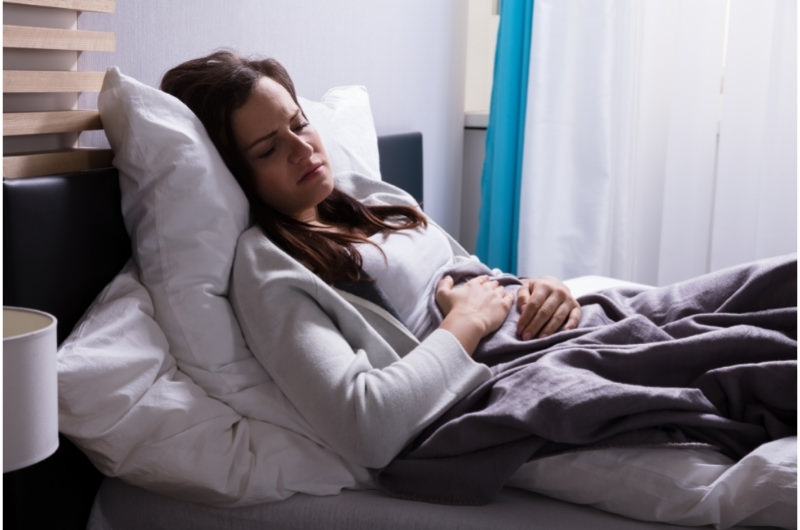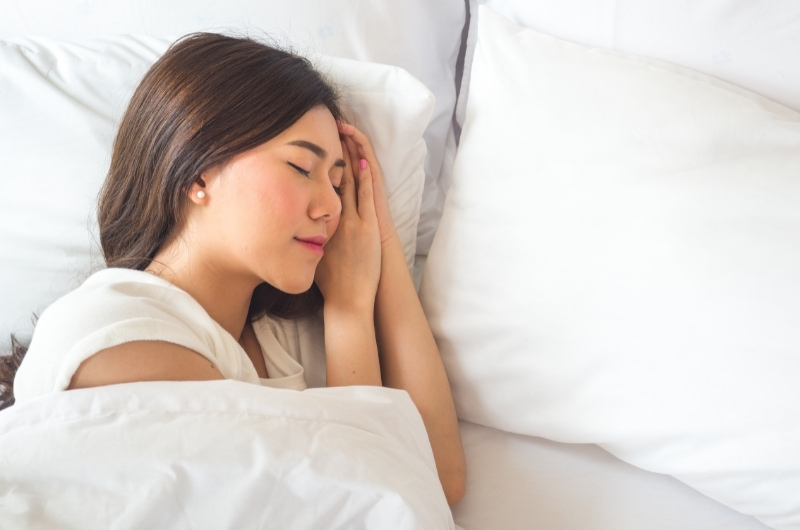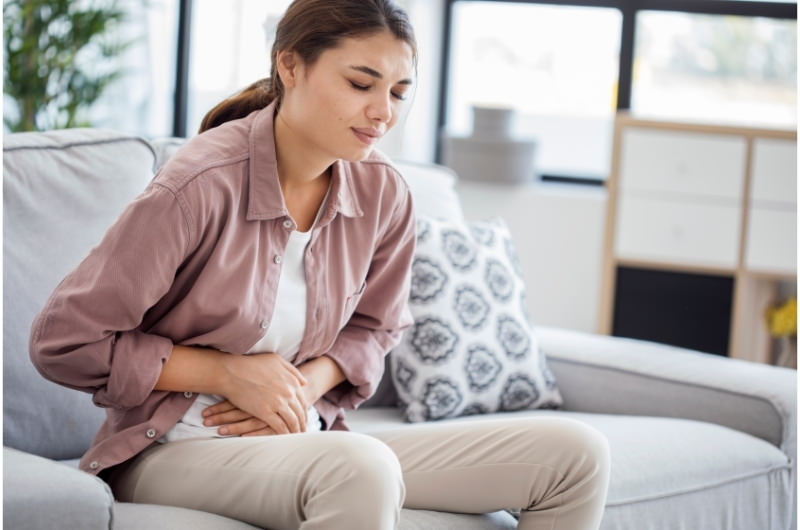Stomach or abdominal pain is a common ailment caused for many reasons. Gallbladder disease, stomach ulcer, food poisoning, diverticulitis, appendicitis, cancers, intestinal disorders, and vascular problems. During pregnancy, lower abdominal cramps are more common. Depending on the severity of your condition, the pain down your stomach can be sharp and dull. Lying down on the back is ideal for soothing your stomach pain and helping you feel relaxed. Whereas laying down on the left side may also relieve your abdominal pain. But when the irritation becomes uncontrollable, it’s best to seek medical help.
You enjoyed a delicious cheese pasta delivered to your doorstep from your favorite restaurant in town last night.
Now, as you lay down to sleep, your stomach begins to make those strange snarling sounds, then comes the cramp, and now you are sitting up with your tummy tightly clutched into your hands, feeling the worst pain in your abdomen.
Digestive issues are more common in people of all ages. More than 72% of Americans alone suffer from digestive conditions such as diarrhea, gas, and abdominal pain.
Possible reasons why your abdominal pain goes away when lying down

Waking up in the middle of the night because of the sharp pain surging through your stomach is quite irritable. But instead of blaming the egg salad you ate last night, it’s wise to pay attention to the symptoms to find the thing bothering your stomach at night.
1) Gas
Gas is the most common cause of stomach and upper abdomen pain.
It’s a sharp stabbing pain causing constant burping and disturbing you from your sound sleep.
2) Stomach ulcer
A burning sensation in your stomach during the night or between meal times is a sign of a peptic ulcer. This pain gets worse when the stomach is full or when there is stomach acid.
3) Diverticulitis
Diverticulitis is a condition where small, bulging pouches of tissues are formed on the lining of the digestive system. As a result, you’ll also feel nausea, fatigue, fever, upset stomach, and unusual bowel habits.
4) Irritable bowel syndrome (IBS)
IBS is a major cause of stomach and abdominal pain in many people. The condition is accompanied by bloating, diarrhea and constipation.
5) Acid reflux
Acid reflux occurs primarily due to excessive drinking, overeating, or lying after a meal. Experiencing acid reflux once a week points to major illnesses, including bleeding and esophageal ulcer.
6) Gallstones
Gallstones obstructing your gallbladder duct may cause pain in your stomach. Gallbladder pain occurs when you eat a big or fatty meal causing you to wake up in the middle of the night.
7) Ovarian cysts
Ovarian cysts are sacs filled with fluid. These sacs are formed on the ovary during ovulation. Large cysts trigger intense pain in the lower abdomen, followed by bloating, sweating, and pressure in the cyst area.
Can stress upset your stomach?
The stomach takes your daily stress way more seriously! A feeling of tightness, churning, cramping, nervousness, or knots in the stomach are significant indicators that directly connect your stomach pain to your mental health.
There are two reasons for this absurd behavior:
- During stress, the adrenal gland releases cortisol hormone into the bloodstream. This leads to constipation, nausea, stomach cramps, and abdominal discomfort.
- Stressful people try to find relief in food and unhealthy beverages such as alcohol, coffee, or tea. This excessive eating and drinking may cause uneasiness in your stomach.
Choose the right position while sleeping
If your stomach pain is mostly due to digestive issues such as gas, diarrhea, or bloating, we will help you ease your gut pain by recommending the right sleeping position.
According to research brain and the digestive system are connected through the enteric nervous system (ENS).
The ENS controls the entire digestion process and keeps the lines of communication open between the brain and the body.
And so choosing an appropriate sleeping position creates a balance between your brain and body, preventing your stomach from growling in the middle of the night.
Sleep on the left side:

By sleeping on the left side, you allow gravity to speed up the digestion process. As a result, the food easily finds its way from the small intestine to the large intestine. Moreover, the ileocecal wall separates the large and small intestines.
By sleeping on your left side, you allow the food to pass easily through the ileocecal walls, reducing digestive difficulties more effectively.
Lying on your back:
Lying on the back to ease the intense stomach pain is the most effective sleeping position.
By laying on your back, you evenly distribute your weight throughout the body, giving your shoulders and hip a break. Moreover, your spine and muscles also feel relaxed when you lay on your back.
Is sleeping on your tummy a good idea during stomach pain?
No, it is not at all recommended to sleep on your stomach when it is already upset!

Putting pressure on your tummy when it is already in great pain is surely not a good idea. Besides, lying on your stomach idea will put more strain on your hips and back.
In addition, this increases inflammation, and you will frequently be rushing to the bathroom.
Can stomach pain get worse with time?
If you have been neglecting your stomach pain for quite some time now, it is time to pay attention to it. The pain may look minor to you, but on the flip side, it may become life-threatening if ignored for long periods.
Common indicators pushing you to pay a visit to a specialist include the following symptoms.
- Hard abdomen
- Coughing and vomiting blood
- Pain and pressure in the chest
- Difficulty in breathing
- Uncontrollable diarrhea
- Loss of appetite
- Rectal bleeding or bleeding in the stool
- Pain gets worse along with a high fever
Final thoughts
Stomach pain can cause you to wake up in the middle of your sound sleep, and with your tiny tummy making growling sounds, the sweet sleep is surely going to flee away.
One time, my husband was out partying all night long. As he’s a food lover, he had a good time eating whatever he could afterward. Unfortunately, whatever he ate, something made him feel sick. We had to head to the hospital late at night to find out that he got food poisoning from something he ate.
Resources
- https://www.foxnews.com/health/survey-shows-74-percent-of-americans-living-with-gi-discomfort
- https://www.hopkinsmedicine.org/health/wellness-and-prevention/the-brain-gut-connection
- https://www.verywellhealth.com/blood-in-stools-1945265


